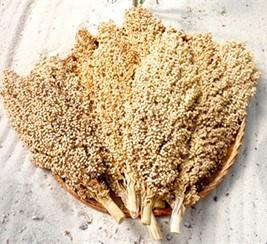Sorghum: A Gluten-Free Whole Grain
Sorghum is recognized as an important farm crop in the United States and has expanded to become one of the top five crops grown worldwide.
Although sorghum has been predominately grown for livestock feed and ethanol production in the United States, it is mainly used for human food elsewhere in the world. This is partly because the crop can grow in harsh environments with drought conditions where other grains do not typically perform as well.
Sorghum provides a powerhouse of nutrition, is high in antioxidants and serves as a good source of fiber and protein.
Additionally, it has gained popularity due to its status as a naturally gluten-free grain, making it highly appealing to individuals who live with celiac disease, gluten intolerance or gluten sensitivity.
Gluten is the protein found in wheat, rye, barley and other grains. These protein fragments can cause an immune system reaction in a small number of people, damaging the small intestine and preventing proper food digestion and absorption.
Rather than give up their favorite foods like bread, cookies, cake and pizza, individuals allergic to or sensitive to gluten can choose foods prepared with sorghum-based ingredients.
As a whole, unprocessed grain, sorghum has a hearty and chewy texture, which makes it the perfect alternative to grains such as couscous and bulgur wheat in soups and side dishes. Sorghum can also be popped like popcorn or even brewed into beer.
White sorghum flour is made from food grade white sorghum that has had the hull removed and milled like other flours. This flour has the size, texture and color of common white-wheat flour but with a slightly nutty flavor. It can be used in a variety of baking applications in conjunction with other flours.
Engineering developments for milling in recent years have resulted in sorghum flour that performs well in baking applications and is appealing in both taste and texture to consumers. Manufacturing companies and home cooks value sorghum flour for its light color, neutral taste and pleasing texture. Several food companies use sorghum in their gluten-free products and baking mixes.
For additional information on the nutritional benefits of food grade sorghum visit www.sorghumcheckoff.com/food/nutrition-information/.


